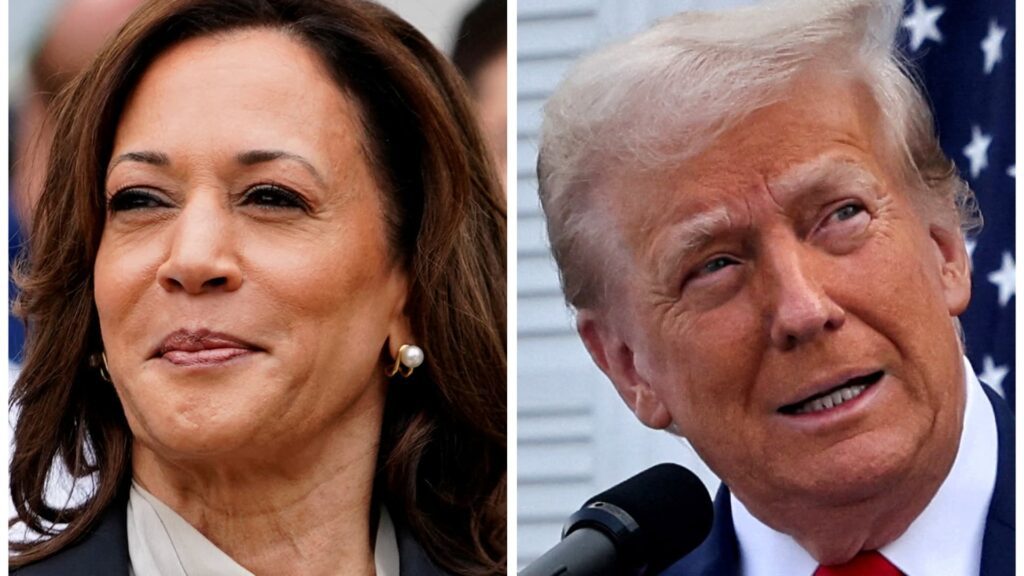Vice President Kamala Harris, left, at the White House in Washington (July 22, 2024), and former President Donald Trump, right, at Bedminster, New Jersey (August 15, 2024).
Nathan Howard | Gina Moon | Reuters
For the first time in the 2024 election cycle, Vice President Kamala Harris is seen as more likely to win the US presidential election than former President Donald Trump, according to a CNBC Fed poll released on Tuesday.
The survey of 27 respondents, including investment strategists, economists and fund managers, found that 48% of respondents believe a Harris win is the most likely scenario, while 41% believe a Trump victory will be the most likely scenario.
The survey was conducted between September 12 and September 14, days after the first, and likely only, debate between Harris and Trump.
The latest forecast marks a change from the last CNBC Fed poll, released in late July, when 50% predicted a Trump victory and just 37% thought Harris would be elected president.
The July survey was released nine days after President Joe Biden dropped out of the race and endorsed Harris.
Last month, while Biden was still campaigning, 48% saw Trump as most likely to win, while 35% expected Biden to be re-elected, and another 17% were unsure or didn’t know.
Since Harris entered the presidential race unopposed in late July, her campaign has fleshed out the vice president’s economic policies and policy proposals. With less than 50 days until the Nov. 5 election, national polls show the rising cost of living remains a top issue for voters.
Harris has focused her economic policy on growing the middle class and lowering costs for consumers by providing housing subsidies, expanding tax credits and deductions and cracking down on what she considers corporate “price gouging.”
On the other hand, Trump is calling for an extension and strengthening of the tax cut policies of his first term, the introduction of tough tariff policies on all imports, and the cancellation of some of the Biden administration’s infrastructure investments.
Fifty-six percent of respondents to a CNBC Fed poll believe a Trump presidency would be better for the stock market than a Harris administration.
The predictions change when the question turns to the broader economy, where 44% think Trump is the better candidate for the overall economy compared to 41% for Harris.
Beyond purely economic issues, when asked which candidate would be better for the country as a whole, 52% of respondents thought Harris would be better, while just 37% thought Trump would be better for the US as a whole.
“Assuming Trump intends to carry out his proposals, broad-based tariffs and mass deportations, or even modest deportations, would raise inflation, slow the economy and perhaps even tip it into a recession,” Joel Naroff, president of Naroff Economics LLC, wrote in response to the survey.
“Other than that, the candidates’ proposals differ more in terms of winners and losers than in their impact on overall economic growth,” he added.
Respondents also predicted that Harris’ economic proposals would be better for the budget deficit and trade policy. Respondents gave Trump higher marks on how his policy proposals would affect business regulation, inflation, jobs and taxes.
Regardless of who occupies the White House, the president’s policy agenda only partially influences the health of the U.S. economy.
For some, that’s a good thing. “Given the bad economic policies that Trump and Harris advocate, we really should hope for a crooked government, as without it, both budget deficits and inflation will rise,” wrote Robert Fry, chief economist at Robert Fry Economics LLC.
Overall, respondents rated the presidential election as the sixth most concerning risk to the U.S. economy out of eight options. The highest economic risk was the possibility that the Federal Reserve will cut interest rates too slowly or by too little.
When asked about the independence of the Federal Reserve, 100% expect Harris to respect the independence of the Federal Reserve, while only 42% believe the same about Trump.
“While the independence of the Federal Reserve may become a major issue under the Trump administration, we must recognize that the Constitution only provides for three branches of government: legislative, judicial and executive,” wrote Richard Bernstein, CEO of Bernstein Advisors. “Since there is no fourth branch, the Federal Reserve, the Federal Reserve will always only be as independent as the existing three branches desire.”
The Federal Reserve is expected to cut interest rates for the first time since March 2020 when it meets on Wednesday.

